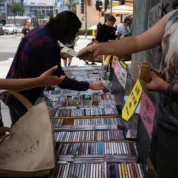
- Famous Artists Accused of Stealing
- Famous Artists Accused of Stealing Money
- 10 Signs Someone Is Stealing from Your Band
- 1. Items going missing
- 2. Discrepancies in bank balances or cash
- 3. Unusual interest in band finances or contracts
- 4. A sudden change in lifestyle
- 5. Spending more time alone
- 6. Sudden changes in behavior
- 7. Issues with expenses or show payments
- 8. An increase in absences
- 9. An increase in personal visitors
- 10. An increase in damaged equipment
The world of music is not without its controversies, and one of the most contentious issues is when musicians are accused of stealing. No matter how well you know those you make music with, it's always wise to be aware of the signs someone is stealing from you. Whether it's taking someone else's melodies or misappropriating funds, scandals have shaken the music industry and tarnished the reputation of some of its brightest stars. In this article, we'll examine some intriguing cases where musicians have been accused of theft, with a particular focus on those who have allegedly stolen money from their own bands or organizations. And then provide you with 10 signs to watch out for, in case someone is stealing from you!
Famous Artists Accused of Stealing
In many ways your band is a business, and your band members are its employees. And it's a sad fact of business life that 75% of employees have stolen at least once from their employer during their tenure. These numbers extend to musicians in their place of work as well. In an office employee theft might be limited to small items of office supplies, or missing cash from a till. While in a band it could be equipment stolen from a practice space or performance, or revenue from concerts, merchandise, or even bar tabs. And in some cases someone might commit more significant fraud. But regardless of the type of business, no one wants to work in an environment based on mistrust and suspicion. As musicians we need to be aware that this type of theft is widespread, and be able to recognize the warning signs. In this article we are going to examine 8 signs that someone you trust may be stealing from you as a musician.
Famous Artists Accused of Stealing Money
While stealing songs is a prevalent issue, an even more shocking aspect of theft in the music industry involves musicians stealing money. My Chemical Romance, the popular rock band, was forced to part ways with their drummer, Michael Pedicone, after they discovered he was allegedly stealing from the band. The incident left fans dismayed and questioning the loyalty and integrity of musicians they had admired for years.
Another striking case of financial theft is that of Nathan Haymer, the former Southern University Band Director. Haymer pled guilty to embezzling funds meant for the university's famed marching band. His actions not only harmed the institution and its students but also cast a dark shadow over the band's illustrious legacy.
These incidents highlight the complex world of music, where creative genius and ambition can sometimes collide with deceit and dishonesty. While these cases of theft may have brought temporary fame or financial gain, the long-term damage to the musicians' reputations and the trust of their fans is a price that is often too high to pay.
10 Signs Someone Is Stealing from Your Band
The music industry is filled with talented individuals who come together to create unforgettable experiences for their fans. However, the unfortunate reality is that some band members may engage in dishonest behavior, such as stealing from their own group. To safeguard your hard-earned success and the integrity of your band, it is crucial to be vigilant and recognize the warning signs of theft. In the following sections, we'll explore 8 indicators that a band member may be stealing from you, and offer advice on how to handle these situations to help protect your music endeavors.
1. Items going missing
The first sign someone is stealing is typically when you notice that things are going missing. It could be, for example, shared items like microphones, cables, headphones or monitor speakers start disappearing. The difficulty is that in many cases someone could have used items like this for legitimate purposes. But if this happens frequently, and you notice multiple unexplained missing items, someone involved with your performances may be stealing from you.
2. Discrepancies in bank balances or cash
A smart thief can hide their theft by manipulating accounting records. Your accounts may balance and look reasonable, while the individual amount you're paid for your share of the show might not be what you expected. If your instincts tell you that your gig should have generated more revenue, trust your intuition. Have an accountant or someone you trust check your records, because discrepancies like this are common, and could indicate an accounting error or theft.
3. Unusual interest in band finances or contracts
An unexpected and/or sudden interest in band finances or contracts by a band member who is not typically involved in those aspects could signal potential theft. While it's important for all band members to be aware of their financial and contractual affairs, a sudden curiosity might indicate ulterior motives.
When a band member who hasn't shown prior interest in the group's finances or contracts starts asking questions or requesting access to sensitive information, it's essential to pay close attention. They may be looking for ways to exploit loopholes, skim profits, or manipulate contracts for their benefit.
As a team, it's crucial to maintain open communication and trust among members. However, it's also essential to ensure that sensitive financial and contractual information is handled by designated and trustworthy individuals. Implementing checks and balances in your band's financial and legal management can prevent theft and maintain a healthy, transparent working environment for all members.
4. A sudden change in lifestyle
Sudden changes in work patterns or behavior could indicate that someone is trying to hide something from you. For example, a band member might suddenly want to take on unexpected responsibilities, or offer to do additional work in vulnerable areas involved with finance or equipment. Of course you don't want to overreact to someone who may just trying to be useful. So I always recommend looking for multiple signs someone is stealing before getting worried. If, for example, these changes correspond with new purchases, then there's reason to be suspicious.
If the only noticeable change is them showing up in an unexpected new car, or wearing more expensive clothes and/or jewelry, you probably shouldn't be too quick to throw out accusations. Music is no longer the "starving artist" industry it once was. Record label executives no longer dominate the music industry's revenue. There are a lot of ways to make money with music independently, which we have an entire channel dedicated to here on Band Pioneer.
However, unusual expenditure is a warning sign you should take note of. Musicians usually know if other band members have side gigs. If this new source of wealth is unexplained, and these sort of purchases happen in continuity with other signs listed in this article, then you have good reason to be suspicious.
5. Spending more time alone
If a band member that use to be extroverted and your group's socialite, suddenly prefers to spend more time alone (maybe driving solo or avoiding social engagements), they could be hiding something. Staying where no one else can see them might be a ploy to conceal fraudulent activities or to dodge questioning. As is the case with most of these points, you need to consider the person's role as well as their behavior. Some members, such as those involved with booking and management, have more opportunity to steal than others do, and therefore present a higher risk.
6. Sudden changes in behavior
Sudden changes in practice schedules or behavior could indicate that a band member is trying to hide something from the rest of the group. For example, a member might suddenly express a desire to rehearse late into the night or during weekends, when others may not be available. Alternatively, they might offer to handle responsibilities in vulnerable areas, such as managing equipment or overseeing finances.
These changes may seem innocuous or even helpful at first glance, but it's crucial to consider the context and motives behind the shift. If these alterations in behavior coincide with other warning signs of theft, such as missing items or discrepancies in finances, there's reason to be suspicious. Establishing clear boundaries, responsibilities, and transparency within the band can help prevent potential theft and maintain a healthy, trusting environment for all members to thrive in their creative pursuits.
7. Issues with expenses or show payments
Repetitive discrepancies with the distribution of gig payments, bar tabs, or band expenses, could be a sign someone is stealing from you. A common way to steal from someone you work with is by claiming false expenses. Keep an eye out for an increase in the number of lost receipts, or in the value of expenses claimed. These things happen occasionally by mistake. But if they're happening regularly, you may need to start asking some difficult questions.
8. An increase in absences
If a band member with a flawless attendance record suddenly starts to take a lot of time off, there could be dishonest intentions behind the absences. Employees that steal from their place of work often get a guilty conscience and start avoiding co-workers and employers. The same can happen with those you work with in music. They could be harboring feelings of shame because of their theft, or not want you to be around when the theft occurs.
9. An increase in personal visitors
It is very common for thieves to enlist the help of an accomplice. Rather than risk getting caught with stolen equipment or accessories, an associate might pass the stolen items to a peer who gains access to practices or event stages as a guest. If a band member suddenly seems to be having a lot of guests around, especially guests you do not know, it could be a sign that the guests are walking away with stolen goods.
If you see vehicles arriving to places where you play music at that you don't recognize, those vehicles could be there to carry off stolen goods. A band associate may only be opening the door for the thieves, but that still makes them a thief.
10. An increase in damaged equipment
Music equipment does get damaged. Especially for bands that play often. However, a sudden increase in reported damaged and faulty equipment could be an indication of theft. An associate could, for example, damage equipment enough to make the band favor an alternate piece of equipment, and then take it home where others may forget about it. Damage to the packaging of equipment or supplies, or claims that deliveries were short are also signs of dishonesty.
Final Thoughts
Music is not an easy gig! Pursuing it as a career or side-hustle demands hard work, creativity, and resourcefulness. To ensure your success isn't undermined by dishonest behavior, it's vital to remain vigilant and proactive. While most musicians you collaborate with will likely be honest and trustworthy, it's important to recognize that some may not be. By identifying and addressing any unreliable band members before they cause significant harm, you can protect your musical endeavors and foster an environment where creativity and integrity can flourish.







Leave a Reply!
I knew this one guy who always had his hands in the cookie jar. He play that bass like nobody's beesknees but he also had a bad habit of taking cash for his own shit. We finally caught him red-handed when we found out he was using the money to buy his pet chinchilla fancy outfits. Watch out for those sneaky bass players!
Red flags for sure. I had to deal with this unfortunately